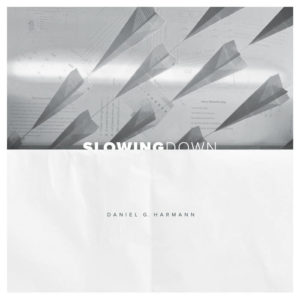
Daniel G. Harmann has been recording, solo or with previous band The Trouble Starts, for the last 15 years. It is not surprising that Slowing Down spends time exploring and investigating the intricacies of the sound he’s created over that time span. His early days as a lushly-orchestrated indie rock songwriter meet his crunchy guitar side and mingle with the sparseness he cultivated all along the way. What results is a thought-provoking album of distinctive indie rock.
Harmann’s most distinctive feature is his voice: he has a sonorous tenor that swoops, swoons, quavers, and warbles elegantly. He is fond of rapid interval leaps and drops in his vocal lines, which gives his melodies an inherently dramatic quality. In his early work (The Books We Read Will Bury Us), the songs were built around these giant moments, but here Harmann integrates his vocal stylings into the arrangements much more. Opener “Carbondale” buries his voice in a shoegaze-like way under a barrage of percussion and synthetic sonic haze, but that’s an extreme case. “Hesitations” is as much about the martial stomp of the drums and synth as it is his voice; the melancholy of “Volition” is powered equally by the guitar performance and his pipes.
That trio of tunes holds down the rock end of the spectrum here; on the other end lie delicate tunes “Dues,” “Zocalo” and “Tectonic.” Harmann has always shown an affinity for the acoustic guitar and has often released guitar and voice songs (Westroy Sessions); here he’s polished those skills to a shine. But Harmann’s acoustic songs are not standard singer/songwriter fare. The unique vocal melodies he is fond of give the work surprising twists and turns. “Dues” is as pretty a song as Harmann has penned in his long career, challenging my personal favorite “Last Swim of the Year” for the crown.
The central piece of the album is “Endless,” which brings together his rock interests and his beauty-minded writing in one package. It starts off with a brittle, distorted slice of guitar work before dropping into mid-tempo minor-key rock. His voice soars over the guitar twice: once as lead, once as ethereal backup. The ghostly vocals usher the transition from the minor-key verses to the major-key “chorus,” where the gritty guitar returns with a bright, muscly, uplifting vibe. It strongly echoes early ’00s Deep Elm Records work, like the White Octave, Appleseed Cast, and the like. After the chorus, the guitar fluctuates again, sending the song out on a chunky, powerful riff and repeating square synth. It’s breathtaking, showcasing the nuance and thoughtfulness that can come from 15+ years in the game. It’s a bit noisier than his early work, but there’s a direct line between then and now in this tune.
If you’re into serious indie-rock, Slowing Down should be on your to-hear list. Harmann has spent years tweaking and refining his sound, creating a distinct sonic space for himself. Those interested in clear, strong songwriting voices will have much to celebrate in Slowing Down.



 Daniel G. Harmann-Anthems from the Gentle War
Daniel G. Harmann-Anthems from the Gentle War Band Name: Daniel G. Harmann
Band Name: Daniel G. Harmann